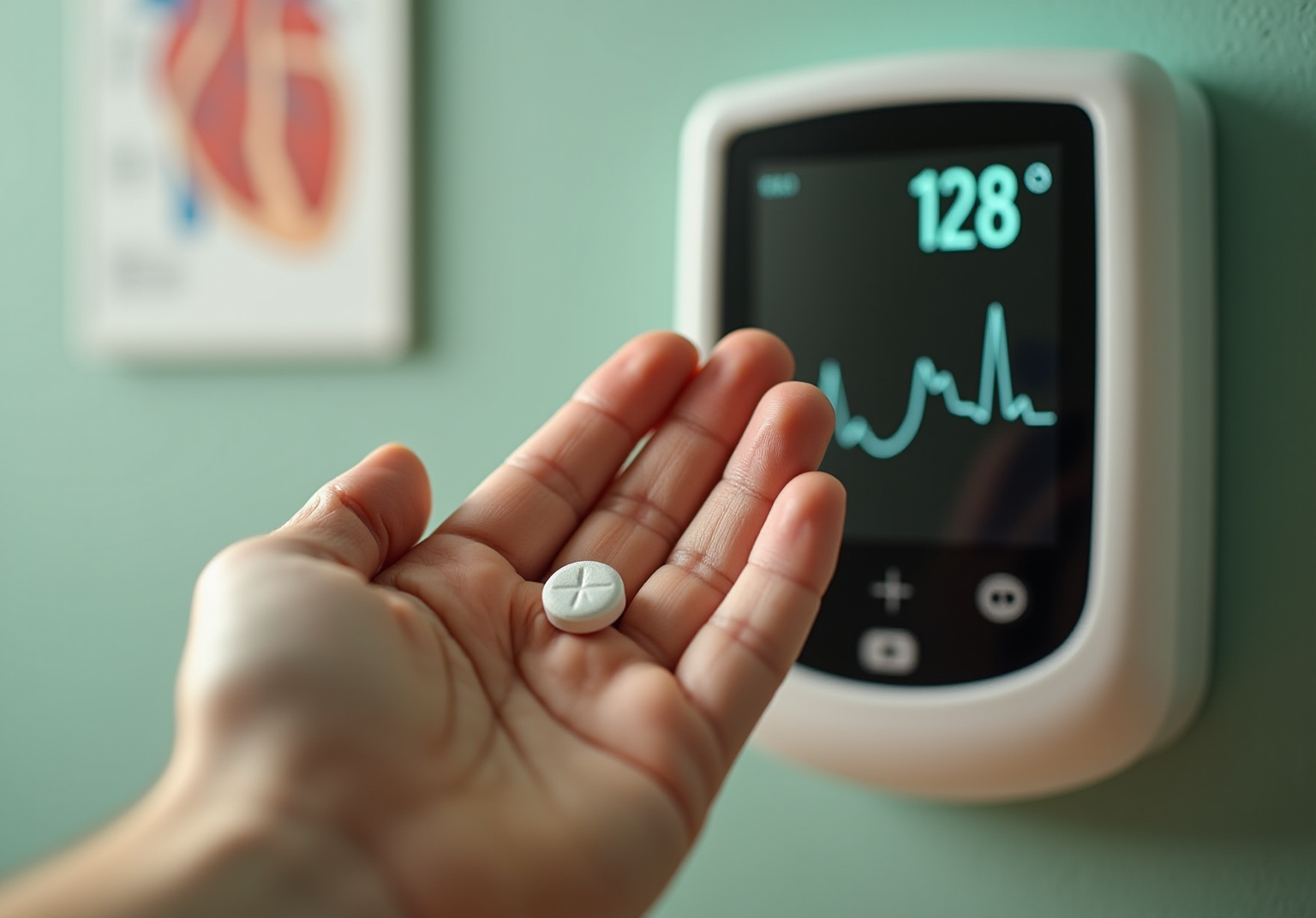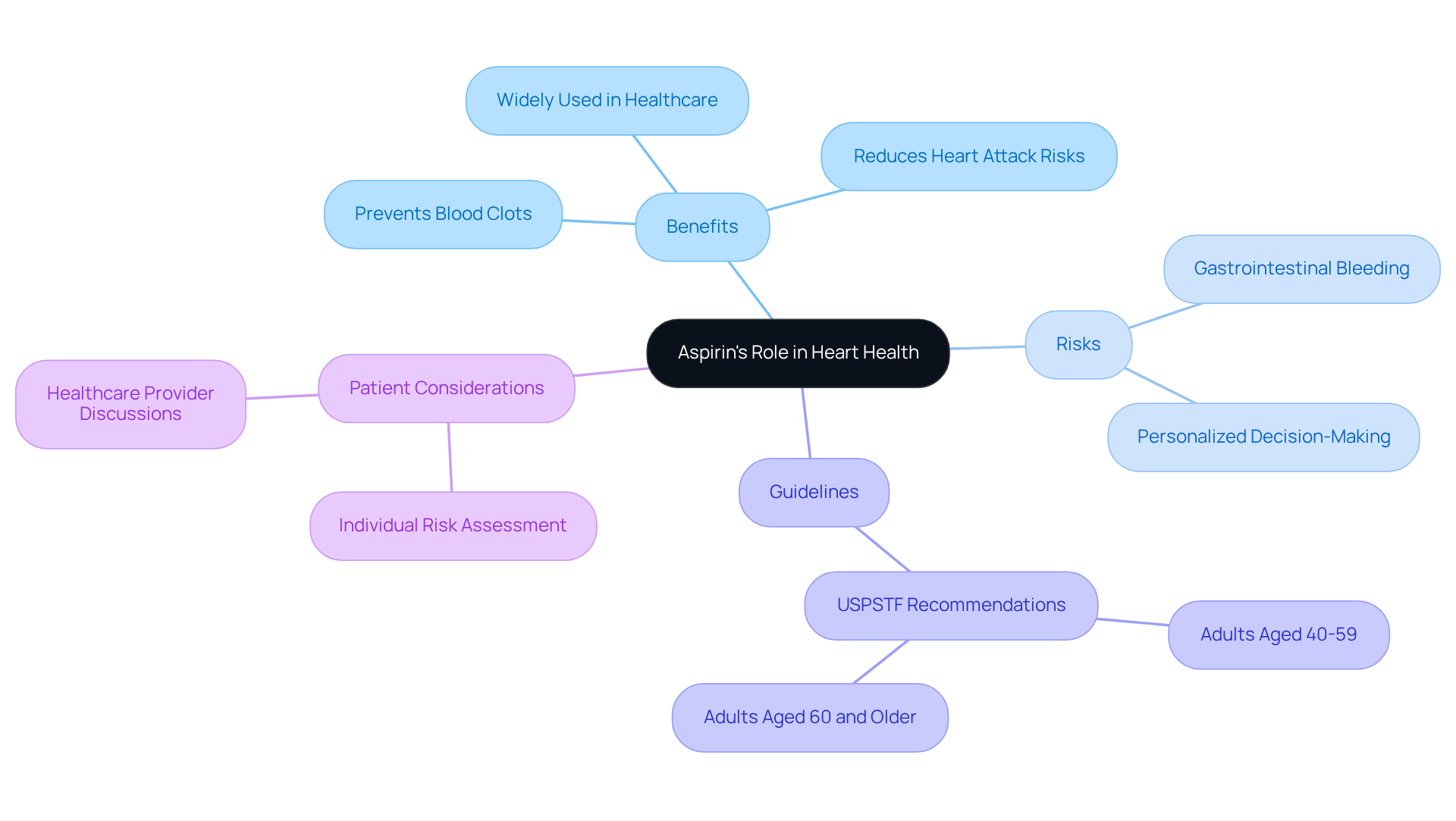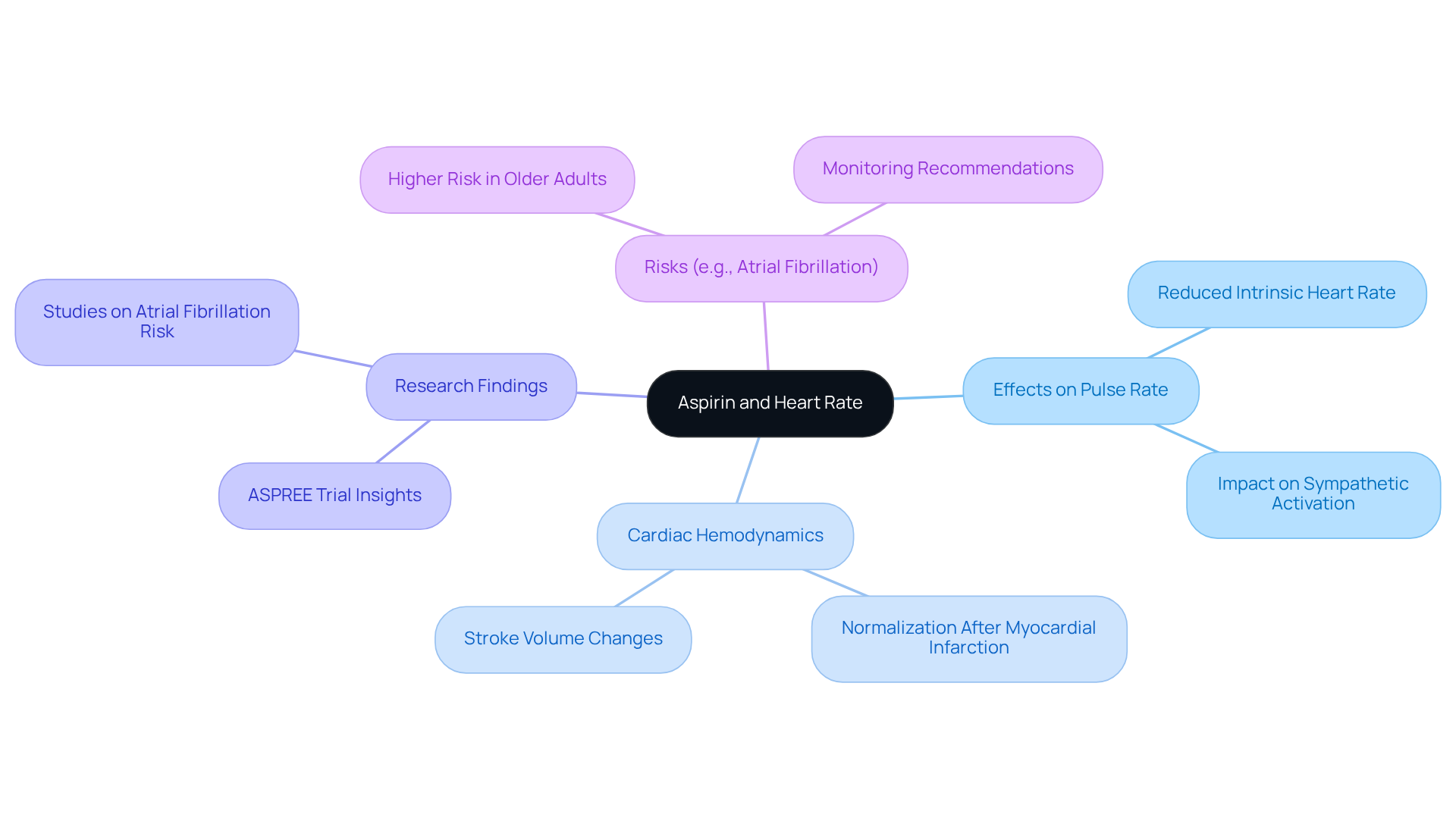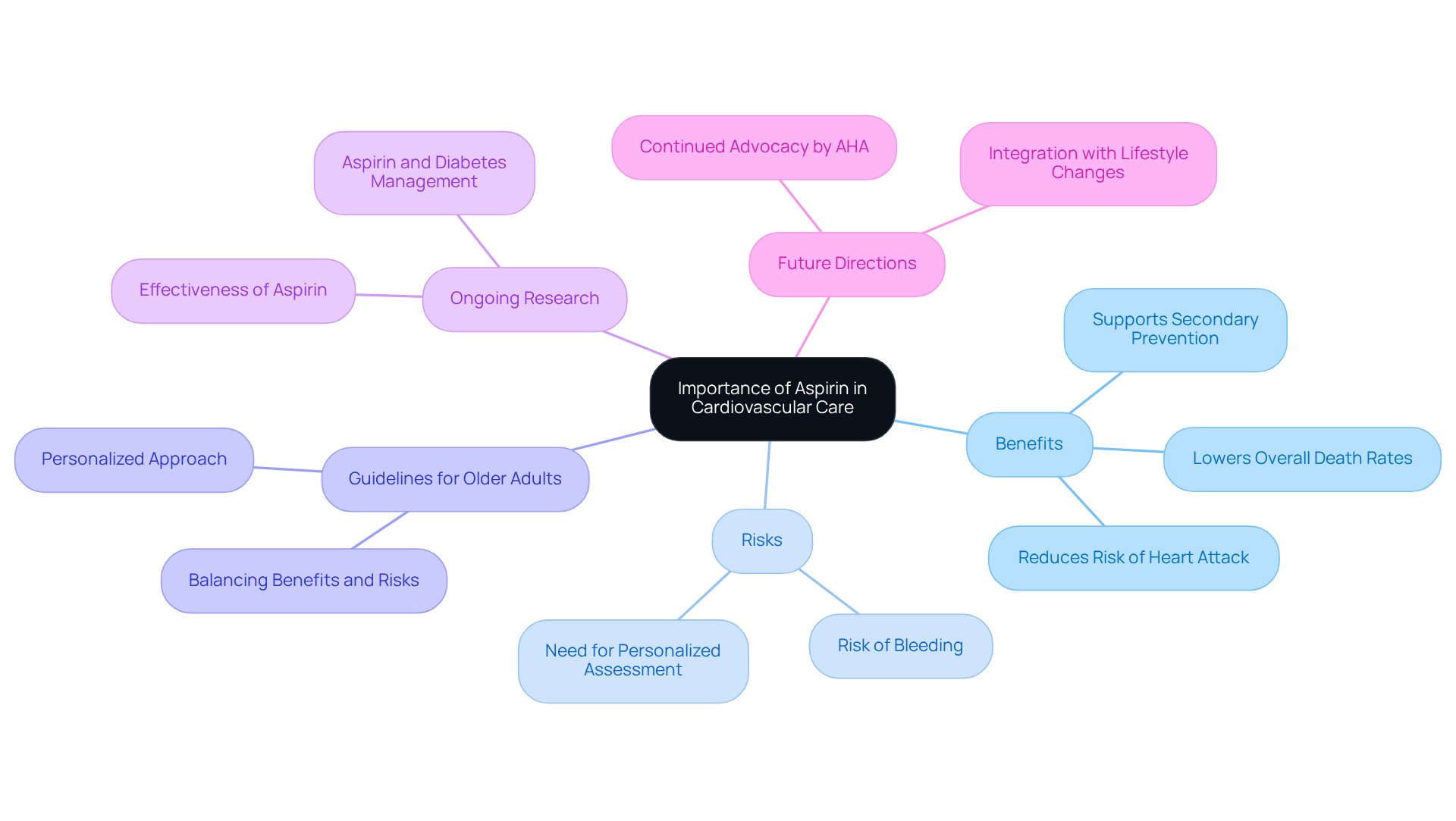


As we navigate the complexities of heart health, many of us find ourselves searching for effective ways to manage cardiovascular risks. Aspirin, a familiar non-steroidal anti-inflammatory drug, is often praised for its ability to prevent blood clots. This is crucial in reducing the chances of heart attacks and strokes, which can be a source of anxiety for many.
But what about its impact on heart rate? This question adds another layer to our understanding of aspirin's role in cardiovascular care. It’s important to explore how aspirin affects heart dynamics, especially as research continues to evolve. Understanding this nuanced relationship can empower us to make informed decisions about our heart health.
If you’ve been feeling uncertain about your heart health, know that you’re not alone. Many individuals share these concerns, and it’s perfectly okay to seek clarity. As we delve deeper into the effects of aspirin, we aim to provide you with the knowledge and support you need to feel confident in your health management. Remember, taking care of your heart is a journey, and we’re here to help you every step of the way.
Aspirin, or acetylsalicylic acid, is a well-known non-steroidal anti-inflammatory drug (NSAID) that many people rely on for its pain-relieving, fever-reducing, and anti-inflammatory benefits. When discussing heart health, a key consideration is whether aspirin lowers heart rate, given its crucial role in preventing blood clots by inhibiting platelet aggregation. This is particularly important in reducing the risk of heart attacks and strokes, leading to the question of whether aspirin lowers heart rate, making it a vital part of managing heart-related conditions.
Over the years, numerous studies have shown how effective aspirin can be in preventing heart-related incidents, both for those at risk and those who have already experienced issues. For instance, research indicates that taking a low dose of acetylsalicylic acid daily can significantly reduce the chances of nonfatal heart attacks and strokes, especially for individuals with a higher risk of heart disease. In fact, a 2019 survey revealed that about one in three adults aged 40 and older used a pain reliever to help prevent atherosclerotic heart disease (ASCVD), highlighting its widespread acceptance in healthcare.
However, it’s important to recognize that using aspirin isn’t always straightforward. Recent guidelines stress the need for personalized decision-making, especially for older adults. The U.S. Preventive Services Task Force (USPSTF) has found that while aspirin can offer some benefits for adults aged 40 to 59 with a 10% or greater 10-year risk of heart disease, it’s generally not recommended for those aged 60 and older due to the increased risk of gastrointestinal bleeding and other complications.
This evolving landscape of pain relief underscores the importance of ongoing conversations between healthcare providers and patients about the benefits and risks of aspirin. As we continue to learn more about how this medication supports cardiovascular health, we also explore the question of whether aspirin lowers heart rate, as it remains a key resource in preventing and managing heart disease.
If you have concerns about your heart health or the use of aspirin, please don’t hesitate to reach out to your healthcare provider. They’re there to help you navigate these decisions with care and understanding.

Many people have concerns about their heart health, and it’s completely understandable to seek clarity on whether aspirin lowers heart rate. Studies suggest that low-dose aspirin may raise the question of whether aspirin does lower heart rate. While it’s mainly recognized for its role in minimizing clot formation, research indicates it may also provide insights into whether aspirin lowers heart rate. This reduction is linked more to its effect on the intrinsic pulse rate rather than a decline in sympathetic nervous system activity.
For instance, recent findings show that individuals taking low-dose acetylsalicylic acid often display reduced pulse rates, raising the question of whether aspirin lowers heart rate, which is connected to its influence on cardiac hemodynamics. However, it’s important to acknowledge that this relationship isn’t straightforward. The use of this medication has been associated with a higher risk of atrial fibrillation, particularly in older adults.
Therefore, the interaction between aspirin and pulse rate is intricate. It’s essential to assess this carefully in medical settings to enhance patient outcomes. If you have any concerns about your pulse rate or the medications you’re taking, please don’t hesitate to reach out to your healthcare provider. They’re there to support you and ensure you feel your best.

Aspirin is an important ally in managing heart health, especially for those with existing heart conditions, which raises the question of whether aspirin lowers heart rate. It’s reassuring to know that organizations like the American Heart Association support its use, as it can significantly lower the chances of having another heart attack or stroke.
For older adults who haven’t experienced heart-related issues, recent guidelines suggest a more personalized approach. This means weighing the benefits of reducing blood clots against the risk of bleeding. It’s a delicate balance, but one that’s essential for ensuring the best care for each individual.
Ongoing research is vital to deepen our understanding of how effective and safe aspirin is, particularly in relation to the question of whether aspirin lowers heart rate, ensuring it remains a key part of heart health strategies. For instance, studies indicate that regular use of aspirin can lead to a notable decrease in overall death rates among those with heart conditions.
As we look ahead to 2025, the American Heart Association continues to champion personalized aspirin therapy as a crucial component of a comprehensive cardiovascular prevention plan, which also includes lifestyle changes.
If you or a loved one are feeling uncertain about heart health, remember that you’re not alone. It’s perfectly normal to have questions and concerns. Reaching out for support can make a world of difference in your journey towards better heart health.

Aspirin plays a vital role in heart health, well-known for its ability to prevent blood clots and lower the risk of heart attacks and strokes. While it’s important to explore whether aspirin can lower heart rate, we must also consider its broader implications for cardiovascular care. For those at risk of heart disease, aspirin can be a crucial tool, offering protective benefits when used wisely.
Research shows that low-dose aspirin may influence pulse rates, but this relationship is complex and varies based on individual health factors. It’s essential to seek personalized medical advice, especially for older adults who might face heightened risks from aspirin use. Ongoing research is key to fully understanding both the benefits and potential drawbacks of aspirin in managing heart health.
Ultimately, the importance of aspirin in cardiovascular care goes beyond its immediate effects on heart rate. It’s vital for individuals to have open conversations with their healthcare providers about the benefits and risks associated with aspirin therapy. By understanding how aspirin can help prevent cardiovascular events, patients can feel empowered to make informed decisions about their heart health, ensuring they receive the best possible care tailored to their unique circumstances.
Have you had a chance to discuss your heart health with your doctor? Remember, you’re not alone in this journey. Engaging in these conversations can lead to better outcomes and peace of mind.
What is aspirin and what are its common uses?
Aspirin, or acetylsalicylic acid, is a non-steroidal anti-inflammatory drug (NSAID) commonly used for its pain-relieving, fever-reducing, and anti-inflammatory benefits.
How does aspirin relate to heart health?
Aspirin plays a crucial role in preventing blood clots by inhibiting platelet aggregation, which is important for reducing the risk of heart attacks and strokes.
Does aspirin lower heart rate?
The article does not specifically state that aspirin lowers heart rate; rather, it highlights aspirin's role in preventing heart-related incidents.
What do studies say about aspirin's effectiveness in preventing heart-related incidents?
Numerous studies indicate that taking a low dose of aspirin daily can significantly reduce the chances of nonfatal heart attacks and strokes, especially for individuals at higher risk of heart disease.
What is the prevalence of aspirin use among older adults for heart disease prevention?
A 2019 survey revealed that about one in three adults aged 40 and older used a pain reliever, like aspirin, to help prevent atherosclerotic heart disease (ASCVD).
Are there any risks associated with aspirin use in older adults?
Yes, recent guidelines suggest that while aspirin can benefit adults aged 40 to 59 with a 10% or greater 10-year risk of heart disease, it is generally not recommended for those aged 60 and older due to an increased risk of gastrointestinal bleeding and other complications.
What should individuals consider when deciding to use aspirin for heart health?
It is important for individuals to engage in ongoing conversations with healthcare providers about the benefits and risks of aspirin, especially considering personal health circumstances.
Who should individuals consult if they have concerns about their heart health or the use of aspirin?
Individuals should reach out to their healthcare provider for guidance and support regarding heart health and aspirin use.